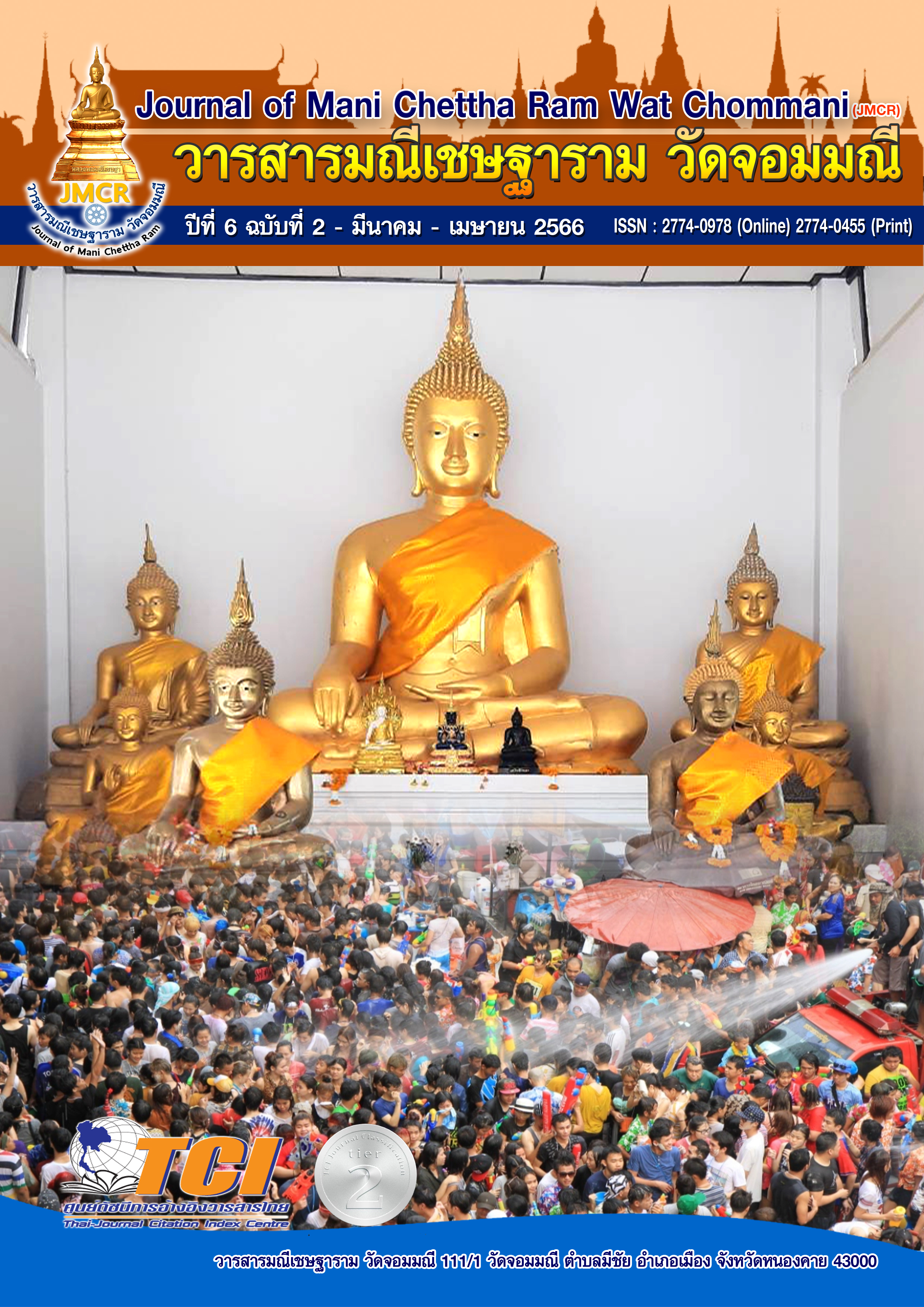APPLICATION OF BUDDHIST PRINCIPLES DURING THE COVID-19 OUTBREAK SITUATION OF SOCIAL WORK STUDENTS MAHAMAKUT BUDDHIST UNIVERSITY
Keywords:
Application, Buddhist Principles, Coronavirus, COVID-19Abstract
This research article the objectives are 1) to study the application of Buddhist principles. 2) to apply Buddhist principles, and 3) to propose the application of Buddhist principles. This research article is a qualitative research. Data were collected using interview forms with 25 key informants. Content analysis and context were analyzed.
The research results were found that: 1) Buddhist principles used by informants during the COVID-19 outbreak situation. namely, the principles of Heedlessness, Mindfulness, Faith, and Wisdom. Objective 2) The application of Buddhist principles (Bhavana 4), namely Physical meditation, most of the informants will take good care of their own health according to public health measures to prevent infection or spread of disease. As for Silaphavana most of the informants were able to strictly comply with the regulations of the government or the Ministry of Public Health. Spirituality Most informants are able to manage their panic attacks. Wisdom Most informants can apply their knowledge in real-life situations. Objective No. 3 Proposal the application of Buddhist principles are 1. Don't panic so much, should be mindful and follow physicians' advice. 2. Applying buddhist principles when faced with a panic situation. 3. Physical health problems effects to Mental Health. Buddhist principles in life to make it through the situation. 4. When there is a problem or can’t find a solution. Buddhist principles will help to be encourage and have principles in life.
References
กฤษฎา บุญชัยและคณะ. (2563). การประเมินความเสียหาย ผลกระทบและการปรับตัวของชุมชนท้องถิ่นต่อภาวะโรคระบาด COVID-19. รายงานวิจัยฉบับสมบูรณ์ มูลนิธิชุมชนท้องถิ่นพัฒนา.
กรมควบคุมโรค. (2564). สถานการณ์ผู้ติดเชื้อในประเทศไทย. เรียกใช้เมื่อ 5 มิถุนายน 2564 จาก https://ddc.moph.go.th/viralpneumonia/index.php.
คณะแพทย์ศาสตร์โรงพยาบาลรามาธิบดี มหาวิทยาลัยมหิดล. (2564). ความเป็นมาของโรคติดเชื้อไวรัสโคโรนา 2019 จุดเริ่มต้นของเชื้อไวรัส ข้อมูลทางวิชาการเกี่ยวกับเชื้อไวรัสโคโรนา 2019 หรือโควิด 19. เรียกใช้เมื่อ 6 มิถุนายน 2564 จาก https://www.mculture.go.th.
จันทิมา ห้าวหาญและพรรณวดี ขำจริง. (2563). ความรู้ความเข้าใจและพฤติกรรมการปฏิบัติตนเกี่ยวกับการป้องกันโรคโควิด-19 (COVID-19) ของประชาชนในจังหวัดภูเก็ต. การประชุมวิชาการระดับชาติ ครั้งที่ 11 ปีการศึกษา 2563 หัวข้อ. Community-led Innovation in the Era of Global Changes amidst Covid-19 Crisis: นวัตกรรมทางสังคมของชุมชนในยุคของการเปลี่ยนแปลงโลกท่ามกลางวิกฤตโควิด 19. 19 กุมภาพันธ์ 2564 วิทยาลัยเทคโนโลยีภาคใต้.
จุลศักดิ์ ชาญณรงค์. (2564). แนวทางการประยุกต์ใช้หลักพุทธธรรมเพื่อดูแลสุขภาพในช่วงวิกฤติโควิด 19. วารสารมนุษย์ศาสตร์และสังคมศาสตร์ มหาวิทยาลัยนครพนม, 11(2), 317-327.
ณัฏฐวรรณ คำแสน. (2564). ความรู้ ทัศนคติ และพฤติกรรมในการป้องกันตนเองจากการติดเชื้อไวรัสโควิด -19 ของประชาชนในเขตอำเภออู่ทอง จังหวัดสุพรรณบุรี. วารสารวิทยาลัยพยาบาลพระจอมเกล้า จังหวัดเพชรบุรี, 4(1), 33-48.
ธีระ วรธนารัตน์. (2565). อยู่อย่างไม่ประมาทอยู่ร่วมกับโควิด-19 ต่อไปอย่างไร. เรียกใช้เมื่อ 10 ธันวาคม 2565 จาก https://chulalongkornhospital.go.th/kcmh/line/linech6/.
ไพเราะ มากเจริญ. (2564). การดูแลกายและใจ ตามหลักพุทธศาสนาในสถานการณ์โควิด 19.เรียกใช้เมื่อ 10 มิถุนายน 2564 จาก https://dmh.go.th/news-dmh/view. asp?id=30999.
พระปลัดสุวัฒน์ สุวฑฺฒโน และ พระปัญญารัตนากร. (2563). การดำเนินชีวิตตามหลักพุทธธรรมในยุคโควิด 19. วารสารสหวิทยาการมนุษยศาสตร์และสังคมศาสตร์, 3(1), 115-128.
แพรพรรณ ภูริบัญชา. (2564). การพัฒนารูปแบบการเฝ้าระวัง ป้องกันและควบคุมโรคติดเชื้อไวรัสโคโรนา 2019 ในพื้นที่เฉพาะ (Bubble and Seal) ของสถานประกอบการ จังหวัดมหาสารคาม. สำนักงานป้องกันควบคุมโรคที่ 7 จังหวัดขอนแก่น.
ปิยะนันท์ เรือนคำและคณะ. (2565). ปัจจัยที่มีความสัมพันธ์กับพฤติกรรมการป้องกันโรคติดเชื้อไวรัสโคโรนา 2019 ของประชากรผู้ใหญ่: กรณีศึกษาเขตจอมทอง กรุงเทพมหานคร.วารสารวิชาการสาธารณสุข, 31(2), 247-259.
ปทุมมา ลิ้มศรีงามและคณะ. (2564). การรับรู้ข้อมูลข่าวสารเกี่ยวกับเชื้อไวรัสโคโรนา 2019 (โควิด-19) ผ่านสื่อสังคมออนไลน์กับทัศนคติและพฤติกรรมการป้องกันโรคในกรุงเทพมหานคร.วารสารมหาจุฬานาครทรรศน์, 8(9), 18-33.
โรงพยาบาลกรุงเทพ. (2565). ฟิตร่างกายสู้ covid-19. สืบค้นเมื่อวันที่ 2 ธันวาคม 2565 จาก https://www.bangkokhospital.com/content/fit-fight-covid-19.
โรงพยาบาลบางกรวย. (2565). กินอย่างไรให้ปลอดภัยและห่างไกลจากโควิด-19. เรียกใช้เมื่อ 2 ธันวาคม 2565 จาก https://www.bangkruaihospital.go.th/.
โรงพยาบาลบำรุงราษฎร์. (2565). การกิน การดื่ม การสัมผัส covid-19. เรียกใช้เมื่อ 2 ธันวาคม 2565 จาก https://www.bumrungrad.com/th/health-blog/april-2020/safely-handling-food-beverage-covid.
Spielberger, C.D., Gorsuch,R.l.and Lushene,R.E. (1970). Manual for the State-Trait Anxiety Inventory (Self Evolution Questionnaire). Polo Alto, CA: Consulting Psychologists Press.




